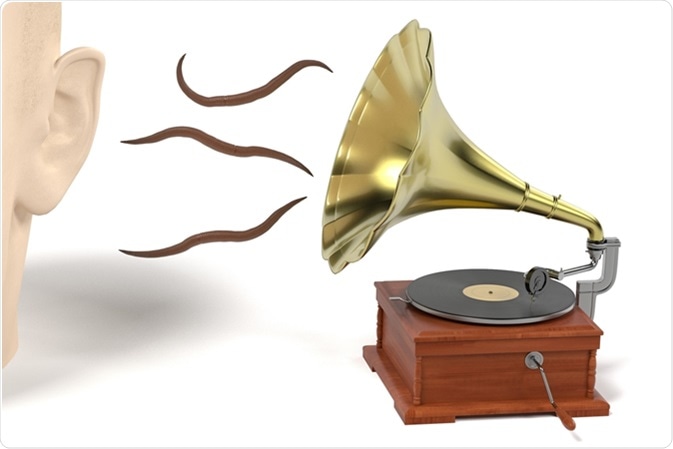Earworms – Why do Songs Get Stuck in Your Head?
Also referred to as stuck song syndrome, earworms are a common phenomenon in the general population where tunes involuntarily arise and stick in the mind on a recurring basis. This may happen spontaneously or it may be triggered by emotion, word associations or having recently heard the tune. Up to 98% of people in the Western world have experienced earworms.
An earworm is defined as “the inability to dislodge a song and prevent it from repeating itself in one’s head,” which is also described as a “cognitive itch.” This earworm experience has been a subject of keen interest to neurologists over the last decade.

Research on Earworms
At Dartmouth College, David Kraemer and colleagues investigated the phenomenon using functional magnetic resonance imaging (fMRI). As reported in the journal Nature in March 2005, the team discovered that when participants listened to a song or song fragment, fMRI showed activation of a brain region called the left primary auditory cortex, which is the region associated with hearing.
This brain region was also activated when participants thought of the song or tried to make up parts of the songs that were not played. This suggests that an earworm may be “fed” by the memory mechanism of the auditory cortex.
An example of a memory system in this brain region is the “phonological loop.” The auditory complex lies in the frontal lobe, the brain area associated with verbal short-term memory and one way in which researchers have described the phonological loop is as a “short loop of recording tape that continuously stores a small amount of auditory information.”
The majority of auditory information is either saved in the form of long-term memory or forgotten, but songs seem to be retained in the form of short-term memory over a greater length of time.
Repetition Theory and Cognitive Itch
At the University of Cincinnati, a study by James Kellaris suggested that the reason the short-term memory endures earworms could be that some songs have certain features that stimulate the brain to react abnormally. These properties that capture the brain’s attention could subsequenlty cause the brain to play the song again in the loop.
Kellaris also found that rather than this repetition resulting in the song being removed from the loop, it extends the presence of the earworm, thereby producing the cognitive itch. Kellaris presented these findings at the Proceedings of the Society for Consumer Psychology Winter 2003 Conference in New Orleans.
Interestingly, researchers have found that musicians or people who report that music is a major part of their life, are more likely to experience earworms on a frequent basis. This supports Kellaris’s theory about repetition, since musicians often have to employ repetition as part of perfecting their musical skills.
Sources
- blogs.scientificamerican.com/…/
- http://berkeleysciencereview.com/earworms/
- http://www.nature.com/nature/journal/v434/n7030/full/434158a.html
- www.telegraph.co.uk/…/…ntists-find-how-to-get-rid-of-earworms.html
- http://bjgp.org/content/66/643/90
- http://www.bu.edu/synapse/2011/11/27/earworms/
Further Reading
- All Audiology Content
- What is Audiology?
- Audiology Diagnostic Tests
- What Does an Audiologist Do?
- Audiology Research
Last Updated: Feb 26, 2019

Written by
Sally Robertson
Sally has a Bachelor's Degree in Biomedical Sciences (B.Sc.). She is a specialist in reviewing and summarising the latest findings across all areas of medicine covered in major, high-impact, world-leading international medical journals, international press conferences and bulletins from governmental agencies and regulatory bodies. At News-Medical, Sally generates daily news features, life science articles and interview coverage.
Source: Read Full Article
